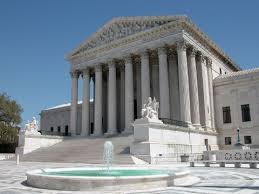 After sending two gerrymandering cases back to the lower courts for further deliberation last week, SCOTUS punts on two gerrymandering cases, the Court had two additional redistricting cases currently under consideration.
After sending two gerrymandering cases back to the lower courts for further deliberation last week, SCOTUS punts on two gerrymandering cases, the Court had two additional redistricting cases currently under consideration.
The Court also sent the case from North Carolina, Rucho v. Common Cause, back to the lower court this morning as well, Supreme Court sends case on North Carolina gerrymandering back to lower court:
The Supreme Court on Monday sent back to a lower court a decision that Republicans in North Carolina had gerrymandered the state’s congressional districts to give their party an unfair advantage.
The lower court will need to decide whether the plaintiffs had the proper legal standing to bring the case.
* * *
When a three-judge panel invalidated the map of congressional districts, it became the first to strike a congressional map on the grounds that it was rigged in favor of a political party [i.e., partisan gerymandering].
North Carolina has a past at the Supreme Court, with redistricting plans struck down as racial gerrymanders. So when the state legislature adopted new plans in 2016, Republican leaders made clear they were drawing the lines to help their party, instead of basing their decisions on racial data.
What these three remands mean is that Justice Anthony Kennedy is not yet ready to rule on partisan gerrymandering cases.
The conservatives on the Court did decide a racial gerrymandering case today from Texas, Abbott v. Perez (.pdf), in which a divided court split along ideological lines 5-4 largely siding with the state of Texas. Some disturbing opinions from Justices Thomas and Gorsuch suggested that the Voting Rights Act does not apply to racial gerrymandering in redistricting, in the conservatives continuing efforts to further gut the Voting Rights Act.


